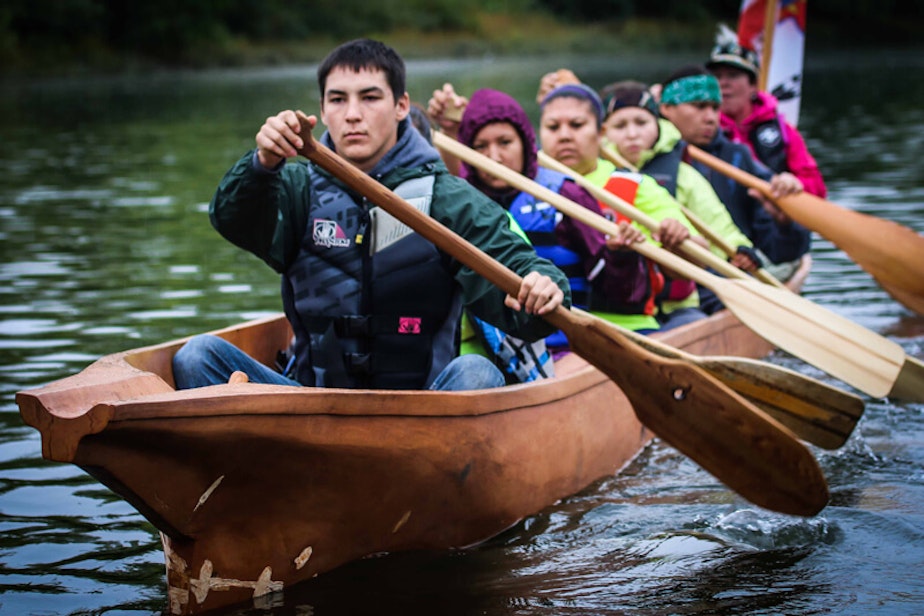'Bring us your dreams.' This Native-led fund aims to 'decolonize philanthropy' in the Northwest

Many levels of government, private foundations and charities are handing out economic recovery grants these days. A Native-led nonprofit serving the Pacific Northwest is carving out a niche by offering grants specifically to help Indigenous communities and artists rebound from the uneven effects of the pandemic.
On Monday, the Seattle-based Potlatch Fund began accepting applications for its newly-created Resiliency Fund. Potlatch Executive Director Cleora Hill-Scott said the fund has $1 million to distribute this year across Oregon, Washington, Idaho and Montana. There could be many grant recipients among tribal governments, nonprofits and individual Native artists and performing groups, because awards are set at $10,000 or $15,000.
"For now, it is about helping as many people as possible, as quickly as possible," Hill-Scott said in an interview. "Bring us your ideas. Bring us your dreams. We're here to fund what you know will help best."
Hill-Scott and her board of directors decided last year to pause their established grantmaking programs centered on community building, Native student education, language preservation and Native arts. They pivoted first to COVID-19 emergency response and then decided this year to focus exclusively on the new Potlatch Resiliency Fund. Its objectives are to spur post-pandemic hope, build resilience and promote cultural revitalization.
Hill-Scott said her organization took some inspiration from another Seattle-area grant maker, billionaire MacKenzie Scott. The ex-wife of Amazon's founder made waves in philanthropic circles beginning last year by giving out multimillion dollar unrestricted gifts to hundreds of organizations and institutions.
Sponsored
"We pivoted around the tenets of community-based philanthropy, which allows the communities to self-identify how best to care for their families and what will help them thrive," said Hill-Scott, who is unrelated to the billionaire Scott.
Hill-Scott (Crow/Sioux/Pawnee) said she admired the other Scott's "trust-based" approach and added that she doesn't want grant recipients to have to mold their programs around the funder's parameters to qualify for money. Another goal Hill-Scott mentioned was "decolonizing philanthropy," which for her hearkens to a return to the Coast Salish potlatch tradition of spreading around clan wealth through periodic gifting ceremonies and social gatherings.
Restrictions on social gatherings during the pandemic were hard on nearly everyone, but Hill-Scott said Indian Country felt the hurt especially deeply because social connections play a key role in maintaining vibrant tribal communities and passing on the culture.
"Most of what we do is around social connections, is around coming together and celebrating," Hill-Scott said.
So, she anticipated that projects seeking funding to revitalize cultural practices and ceremonies, music, arts, storytelling and Native languages would be well received. Other examples of projects that might win funding include support services that encourage healthier living, ranging from physical and behavioral health to substance abuse treatment.
Sponsored
Hill-Scott described the pandemic's effects as uneven across rural reservations and urban Indian communities. Some tribes have needs for rent assistance, food and health care support, while others have those services pretty well in hand. Pandemic control measures led to lengthy closures of tribal casinos around the Northwest, which are a primary source of revenue for tribal education, economic development, health care and natural resource programs.
The latest analysis of COVID-19 infection and hospitalization rates by the Washington State Department of Health showed that American Indian and Alaska Natives were hospitalized at a rate approximately 2.5 times higher than the white and Asian population. In Oregon and Washington, per capita case rates for Native Americans were approximately double the white and Asian population, but far lower than the outsized toll COVID-19 inflicted on the Hispanic and Pacific Islander populations of the Northwest.
The new Potlatch Resiliency Fund was assembled with contributions from many donors, including recognizable names from the technology world such as Microsoft, the Paul G. Allen Family Foundation and Amazon founder Jeff Bezos. The Seattle Foundation, Northwest Area Foundation and Disney Foundation are among others that provided seed money. Hill-Scott said fundraising to increase the pot is ongoing.
The Potlatch Fund nonprofit was formed in 2002 by tribal organizations and funders to address a disparity in philanthropy in which Native communities were being overlooked by grantmaking foundations. Besides making grants itself, the nonprofit also serves as an educational resource and broker to help tribes and outside foundations establish relationships to move funding into Native communities.
Copyright 2021 Northwest News Network

